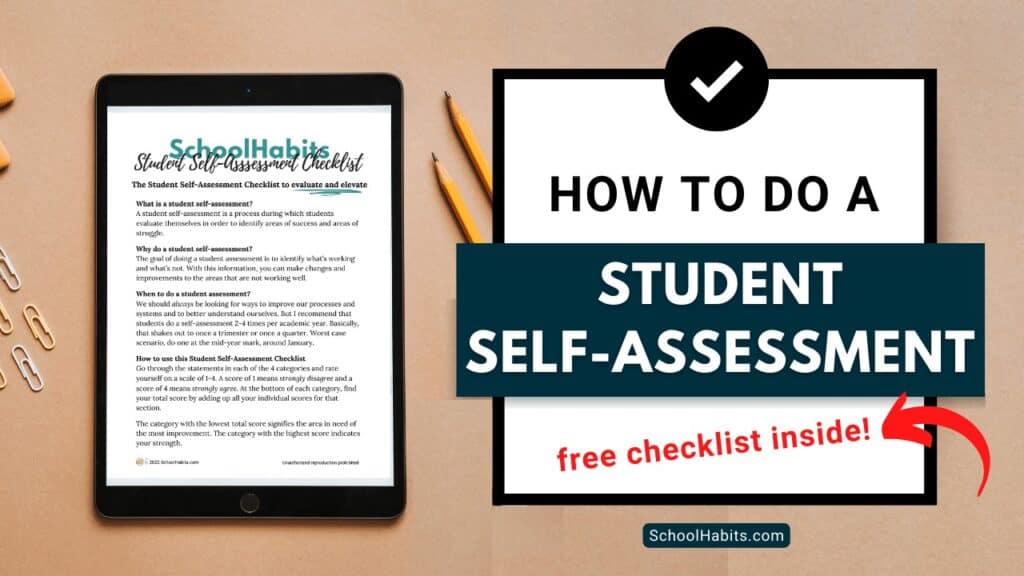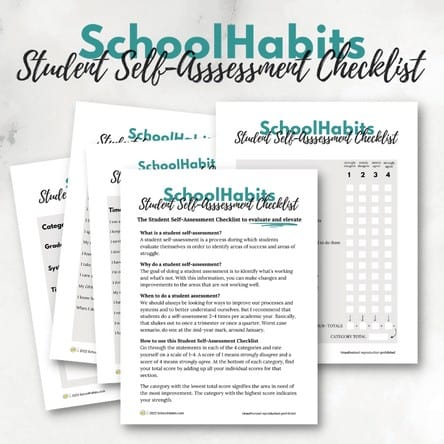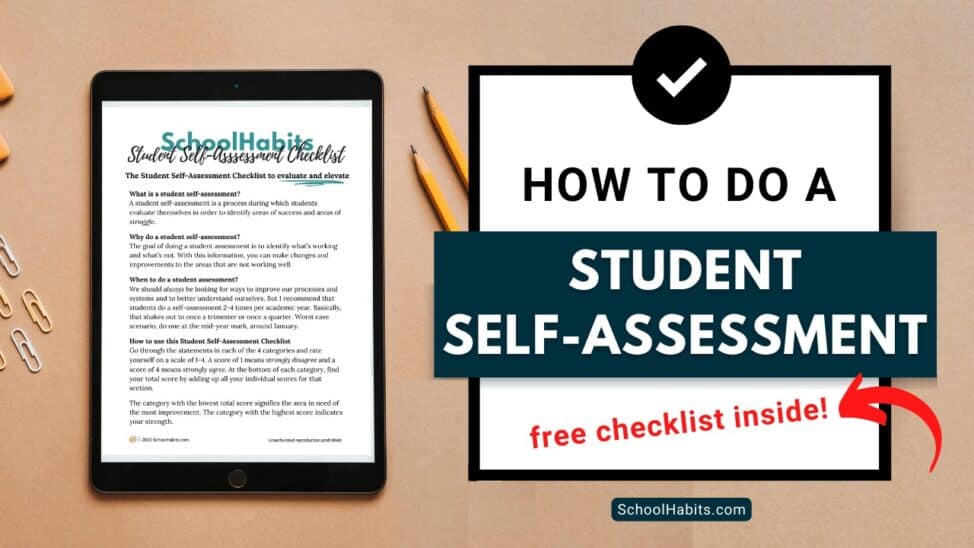
By Katie Azevedo, M.Ed.
This post will teach you everything you need to know about how to do a student self-assessment. To support you in this process, I have made a free Student Self-Assessment Checklist that you can download and use over and over again.
Students are always being assessed by others. Tests, essays, teacher conferences, concerts, sports games – these are all ways that students (you!) are constantly evaluated.
But one of the most important assessments for students is the self-assessment. The ability to honestly reflect on the status of things (what’s going well? what’s not going well?) is critical to doing your best in school. Yes, I know that sounds cheesy and super teacher-y, but I’m not sure how else to put it.
You must know how to do a student self-assessment if you want to improve any areas of your school experience. In this post, I outline four key areas in which students should evaluate themselves. Under each area, I provide a series of guiding questions that will help you examine how you’re doing in each category. If you’re using my accompanying Student Self-Assessment Checklist, I want you to first read through the guiding questions in this post, and then take the quiz in the checklist.
What is a student self-assessment?
A student self-assessment is a process during which students evaluate themselves in order to identify areas of success and areas of struggle.
Why do a student self-assessment?
The goal of doing a student assessment is to identify what’s working and what’s not. With this information, you can make changes and improvements to the areas that are not working well.
When should I do a student assessment?
Every day, all day. Just kidding. Kind of. We should always be looking for ways to improve our processes and systems and to better understand ourselves. But I recommend that students do a self-assessment 2-4 times per academic year. Basically, that shakes out to once a trimester or once a quarter. Worst case scenario, do one at the mid-year mark, around January.
How to do a student self-assessment
A thorough student self-assessment begins by evaluating your experience and performance in key areas related to school. I have identified four critical areas:
- grades
- systems and organization
- time management and schedules
- health and habits
In the sections below, I explain each category and provide guiding questions to help you evaluate yourself in each area.
Again, to help make your self-assessment easier, I have created the Student Self-Assessment Checklist, which you can download and print for free. The Student Self-Assessment Checklist has you rate yourself in each of the 4 categories, providing scores and valuable information that you can use to make changes going forward.
If you don’t want to use the Student Self-Assessment Form, then read through all of the questions below and seriously consider your answers to each one. I suggest writing your answers down so that you actually generate data that you can use. (Trust me: the Student Self-Assessment Checklist is easier.)
Self-Assessment category #1: Grades
Begin your self-assessment by evaluating your grades. While grades don’t tell the whole story, they are easy to understand and provide a fairly accurate snapshot of how you’re doing in school.
Guiding questions to get you started with assessing your grades:
- Are your grades what you want them to be?
- What do you think is causing any low grades? (Tests? Homework? Content difficulty? Attitude? Absences? Learning disability? Inadequate teaching?)
- If you can identify the primary cause of a poor grade, what can and will you do about it? (Ideas here.)
- If you’re in high school, what is your GPA, and is it what you need to get accepted into the colleges you want? If not, what can you do about that?
- If you’re in college, what is your GPA, and is it what you need to maintain any grants, scholarships, or sports deals?
- How are your study habits really? Do you actually know how to study? Is your current study system working for you? Do you need to learn any new study strategies that might work better for you? Here are 5 signs you’re studying wrong.
- Are there any classes that you need extra help in? Where can you get the help? Can you stay after? Why are you not doing that already? (Here’s how to ask for help.)
- Are you taking the right level courses? It’s okay to drop down if you need to. Or, do you need to boost your transcript with high-level courses to meet your graduation goals?
- What are your long-term goals, and are you taking the right courses to get you there? (Example: if you want to be a pre-Med major, you need to take a certain amount of science and math courses in high school.)
Self-Assessment category #2: Systems and Organization
Students should always be self-assessing their systems and organization habits. Make this a regular practice, because as you move upwards through school, your systems need to adapt to higher demands – and you need to know how to adapt them.
Guiding questions to get you started with assessing your systems and organization:
- Is your homework tracking system (assignment notebook) working for you?
- If your homework tracking system is not working well, what are the points of friction (why is it not working? What’s “off” about it?)
- How is your paper organization? Are there areas you can improve? Do you keep too much? Have too many folders? Not enough folders? Don’t like your 3-ring notebook because you never have a whole punch?
- How is your digital file organization? Is your Google Drive a mess? Do you have too many Drive folders or not enough?
- How is your study space working for you? Is it set up to support and inspire you? What could you do to improve it?
- Do you have a good system for taking notes? Are your notes helpful after you take them, and do they make good study guides? Do you need to learn note-taking strategies?
- Do you feel in control of your email management? Signs that you’re not in control include missed emails, a disorganized inbox, missed opportunities, and being overwhelmed with the idea of email.

Self-Assessment category #3: Time management and schedule
A student self-assessment is not complete without an evaluation of how you spend and manage your time. The following questions will help you think about where you’re spending your time, whether procrastination is the root problem, and whether or not your schedule is impacting your school experience.
Guiding questions to get you started with assessing your time management and schedule
- Do you have a proper calendar system set up? If so, how is it working for you? If not, why?
- Are you forgetting dates, deadlines, and appointments, or over-relying on your parents and teachers to remind you of important dates?
- Do you procrastinate a lot? If so, why? What’s stopping you from starting your work on time?
- Do you often run out of time in the day to complete everything you need to do? Why do you think that is?
- Are you doing too many things? Are you overbooked? Do you say “yes” too much?
- If you’re overbooked, what can you start saying “no” to? Can you cut back in any areas?
- Are you doing enough of the right things to build your college application? (If you’re in high school, you need to be building your activity profile starting in ninth grade in order to build a competitive college application.)
- If you’re in college, are you involved in enough career-centered activities that will enhance your professional resume?
- Are you using your time wisely on the weekends?
- Are you wasting your time too much on your phone? Video games? (Be honest.)
- Do you spend enough time studying? Do you even have enough time to study?
Self-assessment category #4: Health and Habits
Our performance in school is greatly impacted by how we take care of ourselves. The following questions will help you assess how you’re doing in the key areas of self-care, mental health, and physical health.
- How is your sleep hygiene? Do you get 8 hours? If not, why? What can you do to improve your sleep? Do you even know how many hours you get?
- Is your caffeine intake healthy?
- How is your anxiety level? What can you do about it? Do you need medical or professional support? If so, get it.
- Are you exercising enough? If not, why? (“I don’t want to” isn’t acceptable. Every able body needs exercise whether you want to or not.)
- How is your confidence? In what areas is your confidence low? How can you improve it?
- How’s your level of happiness? Do you feel happy most of the time? If not, what can you do about it? Who can you talk to?
- What’s your motivation level? Do you rely too much on motivation? (It’s over-rated, trust me.) Have you figured out ways to motivate yourself? If not, why not?
- How are your relationships? Do you have at least one or two close friends that you can rely on? Do you have healthy relationships with adults (teachers, parents, coaches, etc.)? If not, why? What can you do about it?
- How is your diet? A sloppy diet will give you sloppy results in all areas of your life. Do you eat enough vegetables? If not, how can you change that?
What to do after you complete a student self-assessment
I know we say that knowledge is power. I disagree. Knowledge is only POTENTIAL power. Knowing how to do a student self-assessment is a solid first step, actually completing it is the second step, but the final step is where the magic happens …
After you evaluate yourself, you need to do something with the information you gathered. It’s unreasonable to think you can improve all areas at once, so pick one or two areas to work on at a time. I suggest you start with the area that’s giving you the most trouble, and then get someone to help you brainstorm ways to improve. If you’re using the Student Self-Assessment Checklist, start with the area with the lowest score.
Resourcefulness is one of the most important skills anyone could have – students included. So, if you’re stuck finding ways to improve areas indicated by your self-assessment, I want you to start by Googling “How to [fill in the blank here]. You can also use the resources I publish here on SchoolHabits.com and my YouTube videos. You can also check out my tutorial called How to Figure Things Out, where I give you 5 key tips. Of course, you can also reach out to your parents, ask your friends how they run their systems, or bounce ideas off an older sibling. My point is that I don’t want you to do your self-assessment and then stop there: actually use the information… because it’s gold.

